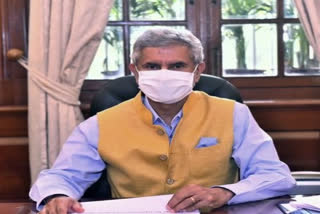New Delhi:The relationship between India and China is at a crossroads and its direction depends on whether the neighbouring country adheres to various agreements on maintaining peace and tranquillity along the border, External Affairs Minister S Jaishankar said on Thursday referring to the eastern Ladakh standoff.
Jaishankar said the then Prime Minister Rajiv Gandhi's visit in 1988 to China 26 years after the 1962 conflict led to a consensus on having stability along the frontier which was followed by the signing of two important agreements in 1993 and 1996 on maintaining peace and tranquillity at the border.
The stability at the border led to the expansion of relations in several sectors, but it was adversely impacted following what happened in eastern Ladakh, he said at a webinar organised jointly organised by the Financial Times and the Indian Express.
At a media briefing, Spokesperson in the Ministry of External Affairs Arindam Bagchi said full restoration of peace and tranquillity in the border areas would enable progress in the bilateral relationship.
The ties between the two countries came under severe strain following a deadly clash in the Galwan valley in eastern Ladakh in June last, over a month after the border standoff began between the Indian and Chinese militaries in multiple friction points in the region.
'I think the relationship is at a crossroads and which direction we go depends on whether the Chinese side would adhere to the consensus; whether it would follow through on the agreements which we both have done... What is very clear in the last year is that border tensions cannot continue with cooperation in other areas,' he said.
Read:SC Collegium recommends elevation of Justice Sanjay Yadav as Chief Justice of Allahabad High Court
Asked about China's attempts to expand influence in the region and competition between the two countries, Jaishankar said India is ready to compete and it has its inherent strength as well as the influence that goes deep into the Indo-Pacific on the one side and Africa and Europe on the other.
'It is one thing to compete, it is another thing to have violence on the border,' he said.
'I am ready to compete. That is not the issue for me. The issue for me is how do I manage a relationship if the basis of the relationship has been violated by one side,' he said.
The external affairs minister said the economic relationship and ties in other sectors between the two countries were driven by the stabilisation of the border through the 1980s and 1990s.
'I do not have a clear cut answer at this point of time. We had the border conflict of 1962 and it took us really 26 years to have the first prime minister's visit in 1988 when Rajiv Gandhi went to China. There was a 1988 sort of consensus which stabilised the border,' he said.
He was asked about where things stand now in ties between the two nations.
